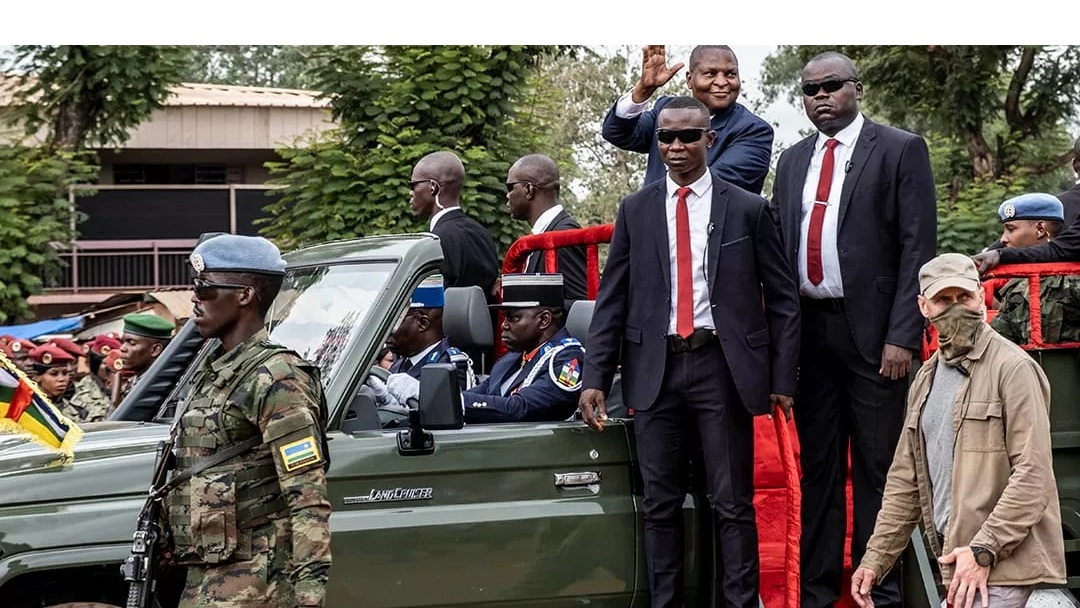As the Central African Republic (CAR) prepares for national elections in December, the anticipated re-election of President Faustin-Archange Touadéra may seem all but certain.
But for opposition leaders and critics, the ballot is not just about the presidency, it’s also about foreign influence, growing authoritarianism, and the long-term sovereignty of the state.
Touadéra, who has been in power since 2016, is seeking another term after a controversial constitutional referendum last year removed term limits.
Yet, as the election nears, concern is rising over the entrenched roles of two powerful foreign players: Russia and Rwanda.
CAR has long grappled with instability.
Touadéra assumed office in the wake of a devastating civil war fueled by armed groups.
In 2018, the Russian paramilitary group Wagner entered the scene, and its presence has since become deeply rooted.
According to local sources, Wagner’s 36-year-old civilian operations head, Dimitri Sytyi, now operates independently of Africa Corps, the Kremlin’s centralized African operations unit.
Meanwhile, Rwanda’s involvement predates Wagner’s. Rwandan peacekeepers have been deployed in CAR under the UN peacekeeping mission MINUSCA since 2014.
Kigali boosted its footprint significantly in 2021, sending 1,000 special forces to stabilize the capital following a major rebel assault.
According to the International Crisis Group, this deployment played a critical role in reviving a fragile peace process between the government and insurgent groups.
Initially, however, the coexistence of Rwandan and Russian forces sparked tension.
Overlapping mandates and a lack of clear direction from the presidency led to friction between the two foreign forces.
“It wasn’t clear who was responsible for what,” said Charles Bouëssel, Central Africa analyst at the International Crisis Group.
“And President Touadéra didn’t make any firm decisions to clarify those roles.”
In recent years, their spheres of influence have become more defined.
Wagner is now responsible for the president’s personal security and military operations in conflict zones.
Rwandan troops, on the other hand, train special forces and oversee relatively stable areas, such as the capital, Bangui, and the border with the Democratic Republic of the Congo, where Rwanda has vested economic interests.
Despite the distinct roles, tensions persist.
Wagner operatives, particularly those guarding mining interests in gold and diamonds, often complain to local officials about sharing economic privileges with Rwandan actors.
This is despite assuming heavier combat responsibilities and suffering more casualties.
Unlike Wagner, Rwanda’s influence in CAR is quieter but pervasive.
Rwandan peacekeepers are visible in daily life, sometimes seen cleaning streets in Bangui.
Ceremonies commemorating the 1994 Rwandan genocide are now held in the capital, a subtle display of soft power, promoting Rwanda as a post-conflict success story and a model for CAR’s own path to stability.
Rwandan entrepreneurs, including former peacekeepers, have established businesses across Bangui, ranging from construction firms to restaurants.
Larger investments come through Crystal Ventures, a conglomerate tied to Rwanda’s ruling party, which has interests in mining, construction, and agriculture.
Despite not yet formally declaring his candidacy, Touadéra’s re-election is widely seen as inevitable.
“There’s little suspense,” said Bouëssel.
“The chance of him being re-elected is about 99%.”
Russia and Rwanda are expected to back the incumbent in order to secure their growing influence in the country.
But traditional Western partners are more cautious. Some are reluctant to fund the election, concerned about ongoing insecurity and the uneven playing field.
Armed groups still hold sway in parts of the country, raising doubts about whether the vote can be free and fair.
Opposition efforts to challenge Touadéra face serious hurdles.
In April, the Republican Bloc for the Defense of the Constitution organized protests in Bangui against the president’s third term.
Demonstrations are expected to continue, but opposition leaders say they face harassment, surveillance, and travel restrictions.
In January, two brothers of Henri-Marie Dondra, a former prime minister and current presidential hopeful, were arrested for allegedly plotting to poison Touadéra.
The opposition remains fragmented, some factions push for reforms before the vote, while others advocate unity through coalition.
Analysts note that Rwanda’s strategy in CAR mirrors its broader foreign policy model: deploy troops, stabilize conflict zones, train local forces, and gain economic footholds.
“There’s a clear economic quid pro quo,” said Danièle Darlan, former president of CAR’s constitutional court.
That model has allowed Rwandan President Paul Kagame to extend his influence from Kigali across CAR and into regions of the Democratic Republic of the Congo and Mozambique.
Some members of Touadéra’s inner circle admire the governance style of leaders like Kagame or Russian President Vladimir Putin,.
On the other hand, others in CAR fear the erosion of national independence.
“This is a fight for the republic,” opposition leader Martin Ziguélé declared at a recent protest.
“A fight for the dignity of the Central African people.”







